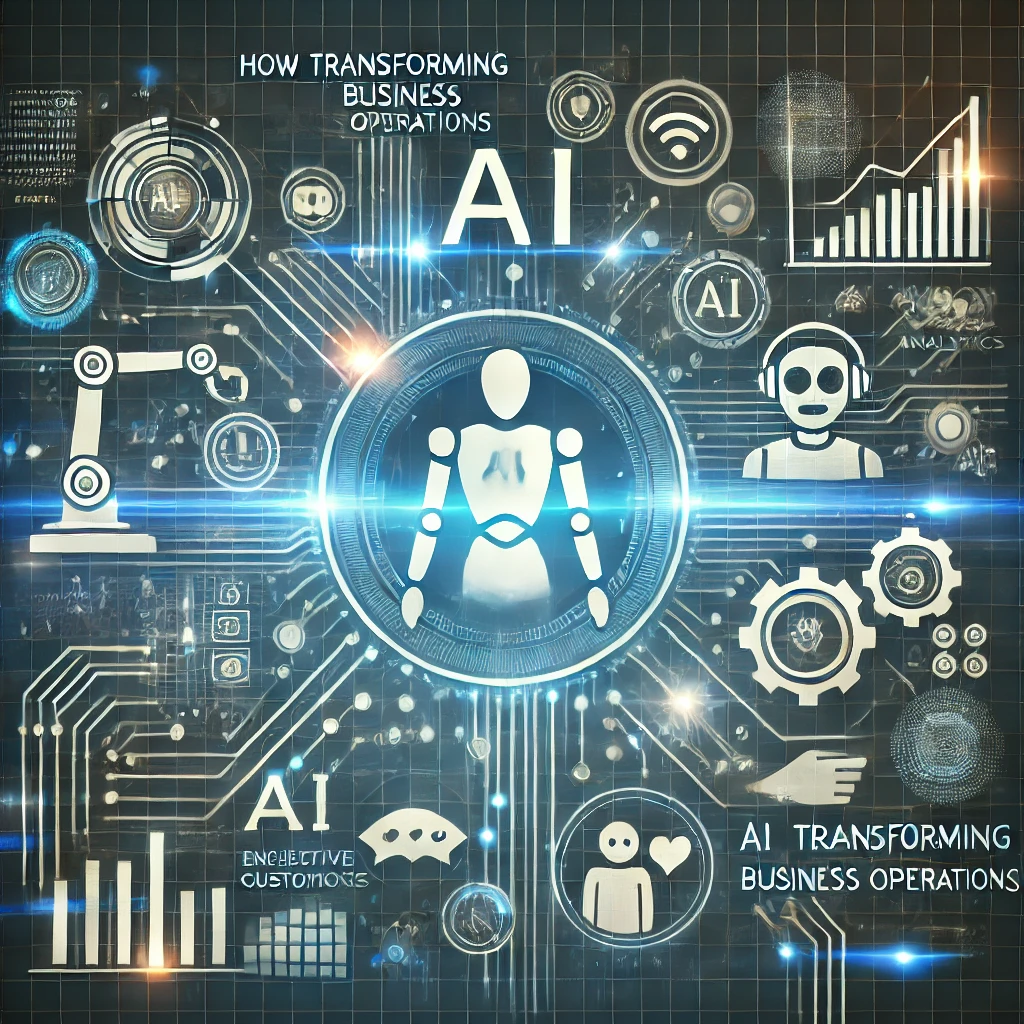

Artificial Intelligence (AI) is revolutionizing the way businesses operate, streamlining processes, improving decision-making, and driving innovation. From automation to predictive analytics, AI offers transformative tools that enhance efficiency and open up new growth opportunities. This article explores how AI is reshaping business operations, the key benefits it brings, and the challenges of adopting this technology.
The Role of AI in Modern Business
AI leverages machine learning, natural language processing, and data analytics to perform tasks traditionally requiring human intelligence. In business operations, it automates repetitive processes, analyzes large datasets, and enables more strategic decision-making.
Key Areas Where AI is Impacting Business:
- Automation of Routine Tasks: Reduces time spent on repetitive activities.
- Predictive Analytics: Provides insights into future trends and customer behavior.
- Customer Interaction: Enhances experiences through chatbots and virtual assistants.
- Supply Chain Optimization: Improves logistics and inventory management.
Benefits of AI in Business Operations
1. Increased Efficiency and Productivity
AI-powered automation minimizes human errors and accelerates workflows.
- Example: Robotic Process Automation (RPA) in accounting automates tasks like invoicing and payroll processing.
2. Improved Decision-Making
AI analyzes large volumes of data to provide actionable insights, enabling better strategic decisions.
- Example: Predictive analytics tools help retailers forecast demand and optimize inventory.
3. Enhanced Customer Experience
AI chatbots and recommendation systems offer personalized interactions, improving customer satisfaction.
- Example: E-commerce platforms like Amazon use AI to suggest products based on browsing history and preferences.
4. Cost Reduction
Automating processes reduces labor costs and increases operational efficiency.
- Example: AI in supply chain management optimizes routes, cutting transportation costs.
5. Scalability
AI systems handle increasing workloads without the need for proportional resource expansion.
- Example: Cloud-based AI tools scale customer support as businesses grow.
Applications of AI Across Industries
1. Healthcare
- AI diagnostics and imaging tools identify diseases faster and more accurately.
- Virtual health assistants manage patient queries and schedules.
2. Finance
- Fraud detection systems monitor transactions in real-time.
- AI-driven investment platforms offer portfolio management and financial advice.
3. Retail and E-Commerce
- AI personalizes shopping experiences and streamlines supply chain logistics.
- Visual search tools enable customers to find products using images.
4. Manufacturing
- Predictive maintenance powered by AI minimizes equipment downtime.
- AI robots improve precision and efficiency in production lines.
5. Human Resources
- AI recruitment tools screen resumes and identify the best candidates.
- Sentiment analysis gauges employee satisfaction and engagement.
Challenges of Adopting AI
1. High Implementation Costs
Deploying AI requires significant investment in technology, infrastructure, and talent.
2. Data Privacy and Security
AI systems depend on data, raising concerns about privacy and cyber threats.
3. Lack of Skilled Workforce
Many businesses face a shortage of professionals with AI expertise.
4. Ethical Concerns
Bias in AI algorithms and decision-making raises questions about fairness and accountability.
5. Integration Complexity
Integrating AI into existing systems can be challenging, requiring careful planning and execution.
Strategies for Successful AI Integration
- Start Small: Begin with pilot projects to understand AI’s potential impact.
- Invest in Training: Upskill employees to effectively use AI tools.
- Focus on Data Quality: Ensure clean, well-structured data for accurate AI outcomes.
- Collaborate with Experts: Partner with AI vendors or consultants to streamline implementation.
- Monitor and Evaluate: Continuously assess AI’s performance and adjust strategies as needed.
Real-World Examples of AI Transformation
Tesla
Tesla uses AI for autonomous driving, enabling vehicles to navigate and make decisions without human intervention.
Netflix
Netflix leverages AI algorithms to recommend shows and movies based on user preferences, driving customer engagement.
IBM Watson
IBM Watson assists in healthcare by analyzing patient data to suggest personalized treatment options.
The Future of AI in Business
As AI technologies evolve, their impact on business operations will grow even further:
- Hyper-Personalization: AI will enable deeper customer insights for highly tailored experiences.
- Enhanced Collaboration: AI tools will integrate with collaborative platforms to improve teamwork and productivity.
- Sustainable Practices: AI will optimize resource use and reduce waste in various industries.
Conclusion
AI in business is no longer a futuristic concept—it’s a reality reshaping operations across industries. By automating tasks, enhancing decision-making, and personalizing customer interactions, AI drives efficiency and innovation.
While challenges like high costs and ethical concerns remain, businesses that strategically adopt AI will gain a competitive edge in the ever-evolving market. Embracing AI today sets the foundation for success in a technology-driven future.
Read More About Nagagog’s Unique Subspace Army Enemies in Super Smash Bros. Brawl




